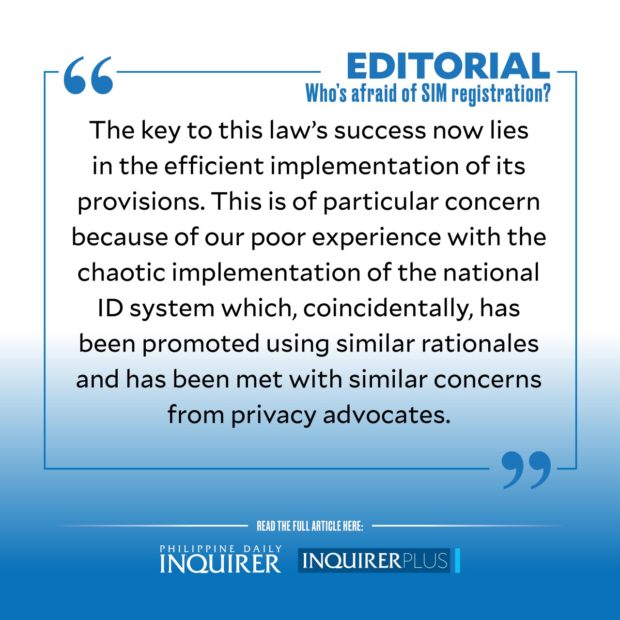Who’s afraid of SIM registration?
Its advocates have promoted it as a deterrent to cybercrime and digital fraud.
Its critics have painted is as a tool for telecommunication firms to exploit Filipinos’ personal data for financial gain or for the government to transform the country into a surveillance state.
But, as with any new law, the truth about the new SIM Card Registration Act is somewhere in between these two extreme scenarios.
Over the next few months, an estimated 180 million subscriber identification module (SIM) cards are expected to be registered into the databases of the country’s mobile phone companies.
This is a gargantuan task because only a small fraction—less than 5 percent—of the Philippines’ mobile phone users have so-called postpaid plans where the signup process requires extensive identification checks and proof of one’s ability to pay the monthly bill. The rest of the country’s less affluent population rely on prepaid accounts whose SIM cards can be bought at neighborhood stores for as low as P50, or given away free in some cases without any need for the user to present any form of ID.
This anonymity is often exploited by scammers and spammers who use anonymous mobile accounts to, among others, digitally defraud unsuspecting victims or saturate millions of users’ phones with unsolicited text offers.
The idea of this new law is to make it easier for authorities to identify the person making a call, sending a text message, or accessing the internet using cellphone networks. Knowing that authorities have the legal means to pinpoint exactly who is using a mobile device at any given time will, hopefully, deter online fraudsters or even criminals from using digital platforms for their nefarious activities.
The key to this law’s success now lies in the efficient implementation of its provisions. This is of particular concern because of our poor experience with the chaotic implementation of the national ID system which, coincidentally, has been promoted using similar rationales and has been met with similar concerns from privacy advocates.
With the SIM Registration Act, the government has an important role to play in guaranteeing that it will use properly the wealth of information about citizens that it will henceforth have access to. Under no circumstances must private data be used for political purposes, most especially against people exercising their right to criticize government. To this end, the reassurance of Justice Secretary Jesus Crispin Remulla that no such thing will happen is a welcome development.
Private telecommunications companies also have an essential role in ensuring that the signup process of millions of Filipinos be done as efficiently and as painlessly as possible. More importantly, they must ensure their data treasure trove is transmitted and stored securely to prevent their accidental or deliberate misuse.
Finally, mobile phone users must all comply faithfully with the registration requirements of the law as soon as they can, without cramming to meet the deadline, as is this nation’s bad habit. It is also paramount that Filipinos be vigilant against any violations of this law, whether by the government or the private sector.
This is important because this legislative journey has been full of out-of-character surprises.
For one, then Sen. Franklin Drilon, who is usually liberal-minded, made a last minute insertion in the previous version of this measure that would have required Filipinos to use their real identities when creating social media accounts, supposedly to combat online “trolling.” This was deemed a dangerous overreach, which could be abused by the government. Then former president Rodrigo Duterte delivered the other surprise when he, despite his authoritarian tendencies, ended up vetoing that incarnation of the SIM card measure precisely because of the social media registration requirement.
Indeed, the proponents of the new SIM Card Registration Act have held it up as a panacea for all ills that plague the digital space, from online fraud, to text message spamming, to even abusive debt collection practices that rely on harassing phone calls.
Meanwhile, the doubters of the law believe that telecommunications giants are about to make money hand over fist by selling their subscribers’ personal information to private firms for their marketers to exploit. Worse, they feel that the list-up that began yesterday brings the Philippines only one step away from police state status, where dissent will be stifled by law enforcers tapping phones and suddenly arresting government critics.
As with any law, the truth will probably be somewhere in between these two extreme ideas. But hopefully, all stakeholders—the government, private firms, and the citizenry—will implement it properly so that this important measure is actualized closer to its ideal: useful and comforting for law-abiding citizens, and dangerous to lawbreakers.





















